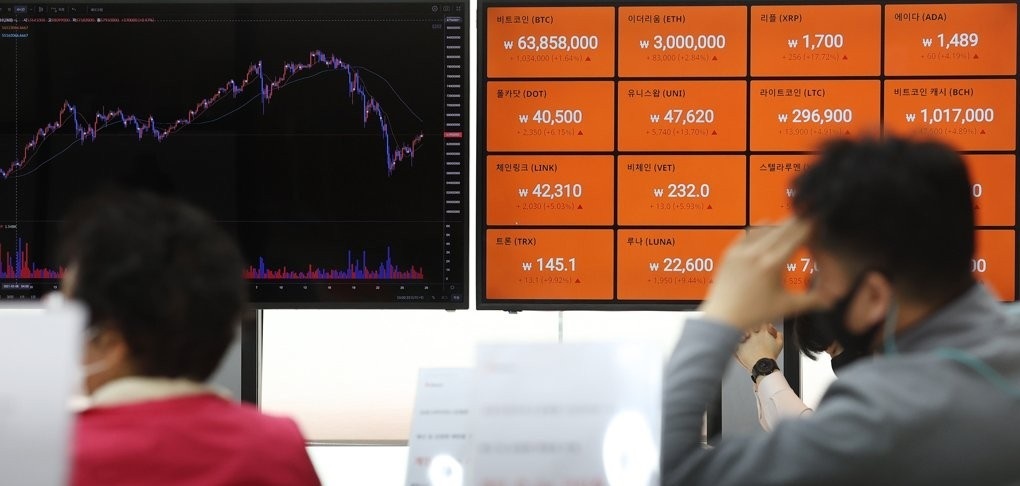 |
Digital signboards show the prices of cryptocurrencies at local cryptocurrency exchange Bithumb’s office in southern Seoul on April 27, 2021. (Yonhap) |
Some major South Korean financial conglomerates, including KB and Hana, have decided not to issue real-name bank accounts for virtual coin trading on local crypto exchanges, citing heavy accountability and hacking risks, according to news reports Sunday.
A new bill passed at the National Assembly in March requires local crypto exchanges to meet anti-money laundering requirements, and utilize real-name bank accounts from commercial banks for crypto trading. Local banks also need to decide by the end of September whether to partner with crypto exchanges to allow the opening of new bank accounts for cryptocurrency trading.
Of 200 domestic exchanges, only four -- Upbit, Bithumb, Coinone, and Korbit -- have been utilizing the real-name system for trading in partnership with commercial banks.
“Cryptocurrencies could join the mainstream someday in the future, but for now, it is highly risky to work with crypto exchanges as money in the crypto market could be involved in crimes,” a KB executive was quoted as saying in a report by Yonhap News.
“The company is not considering to sign a partnership for the real name system with local crypto exchanges,” the executive added.
Any involvement in money laundering and financing of terrorism could force local banks to shut down its operations here and abroad.
Hana Financial Group also decided that it is still premature to work with the exchanges, as doubts remain over whether small crypto exchanges observe principles of distributed ledger, a base technology for blockchain used for more secure payment transfers, clearing and settlement processes.
Woori too, echoed the risks raised by the two banking groups.
“Returns from alliance with crypto exchanges, mostly trading fees, are not much greater than risks stemming from possible money laundering issues and hacking attacks,” a top Woori official told Yonhap.
“The bank has asked K bank to keep an eye on the existing contract with Upbit,” the official said.
Woori is the second-largest shareholder of K bank, an online-only bank that allows bank account openings for crypto traders on the Upbit platform, one of the biggest digital coin exchanges in Korea.
Some market experts warned that many small exchanges that do not hold real-name accounts could be run out of business down the road.
“Without detailed guidelines to follow, the financial authorities have pressed banks and exchanges to get themselves prepared with the real-name system in the crypto market,” said an official from a local crypto firm, adding that “exchanges, except the ‘big four,’ could go out of business and the large ones would dominate the industry.”
Meanwhile, the entire market cap of crypto coins listed on Upbit dropped nearly 40 percent recently. The UBMI, an index developed by Upbit to depict the change of the entire market cap in Korea, dropped 37 percent from 13,972.08, the highest on record, on May 9 to around 8,800 on Sunday.
By Kim Young-won (
wone0102@heraldcorp.com)








